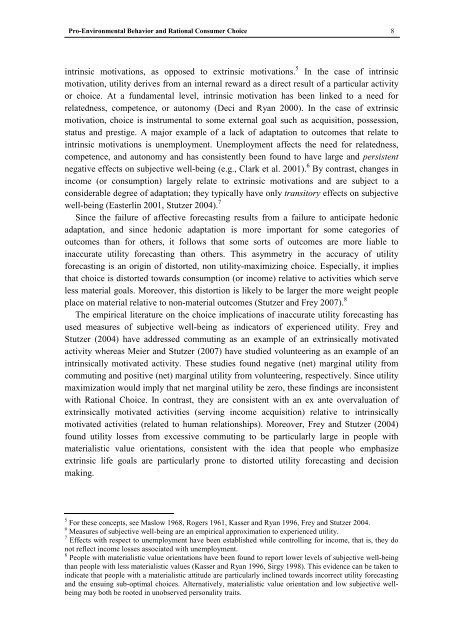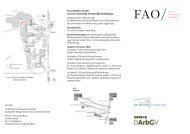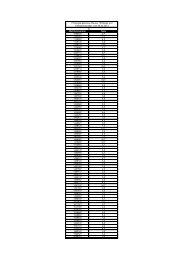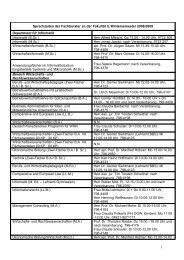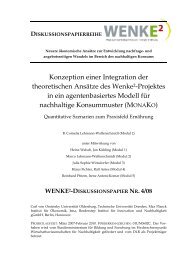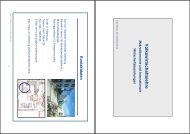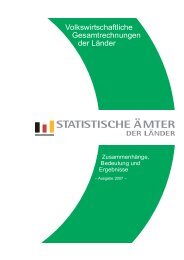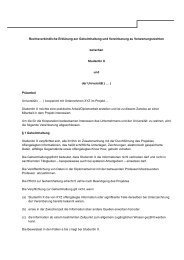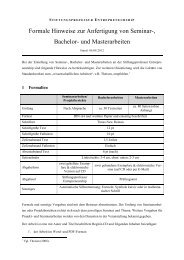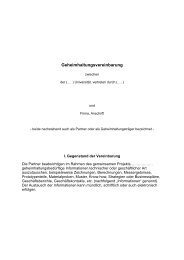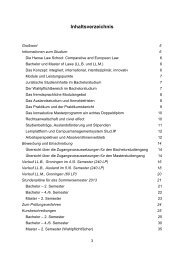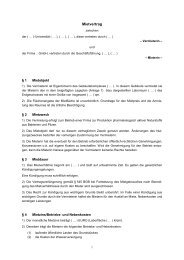Pro-Environmental Behavior and Rational Consumer Choice
Pro-Environmental Behavior and Rational Consumer Choice
Pro-Environmental Behavior and Rational Consumer Choice
You also want an ePaper? Increase the reach of your titles
YUMPU automatically turns print PDFs into web optimized ePapers that Google loves.
<strong>Pro</strong>-<strong>Environmental</strong> <strong>Behavior</strong> <strong>and</strong> <strong>Rational</strong> <strong>Consumer</strong> <strong>Choice</strong> 8<br />
intrinsic motivations, as opposed to extrinsic motivations. 5 In the case of intrinsic<br />
motivation, utility derives from an internal reward as a direct result of a particular activity<br />
or choice. At a fundamental level, intrinsic motivation has been linked to a need for<br />
relatedness, competence, or autonomy (Deci <strong>and</strong> Ryan 2000). In the case of extrinsic<br />
motivation, choice is instrumental to some external goal such as acquisition, possession,<br />
status <strong>and</strong> prestige. A major example of a lack of adaptation to outcomes that relate to<br />
intrinsic motivations is unemployment. Unemployment affects the need for relatedness,<br />
competence, <strong>and</strong> autonomy <strong>and</strong> has consistently been found to have large <strong>and</strong> persistent<br />
negative effects on subjective well-being (e.g., Clark et al. 2001). 6 By contrast, changes in<br />
income (or consumption) largely relate to extrinsic motivations <strong>and</strong> are subject to a<br />
considerable degree of adaptation; they typically have only transitory effects on subjective<br />
well-being (Easterlin 2001, Stutzer 2004). 7<br />
Since the failure of affective forecasting results from a failure to anticipate hedonic<br />
adaptation, <strong>and</strong> since hedonic adaptation is more important for some categories of<br />
outcomes than for others, it follows that some sorts of outcomes are more liable to<br />
inaccurate utility forecasting than others. This asymmetry in the accuracy of utility<br />
forecasting is an origin of distorted, non utility-maximizing choice. Especially, it implies<br />
that choice is distorted towards consumption (or income) relative to activities which serve<br />
less material goals. Moreover, this distortion is likely to be larger the more weight people<br />
place on material relative to non-material outcomes (Stutzer <strong>and</strong> Frey 2007). 8<br />
The empirical literature on the choice implications of inaccurate utility forecasting has<br />
used measures of subjective well-being as indicators of experienced utility. Frey <strong>and</strong><br />
Stutzer (2004) have addressed commuting as an example of an extrinsically motivated<br />
activity whereas Meier <strong>and</strong> Stutzer (2007) have studied volunteering as an example of an<br />
intrinsically motivated activity. These studies found negative (net) marginal utility from<br />
commuting <strong>and</strong> positive (net) marginal utility from volunteering, respectively. Since utility<br />
maximization would imply that net marginal utility be zero, these findings are inconsistent<br />
with <strong>Rational</strong> <strong>Choice</strong>. In contrast, they are consistent with an ex ante overvaluation of<br />
extrinsically motivated activities (serving income acquisition) relative to intrinsically<br />
motivated activities (related to human relationships). Moreover, Frey <strong>and</strong> Stutzer (2004)<br />
found utility losses from excessive commuting to be particularly large in people with<br />
materialistic value orientations, consistent with the idea that people who emphasize<br />
extrinsic life goals are particularly prone to distorted utility forecasting <strong>and</strong> decision<br />
making.<br />
5 For these concepts, see Maslow 1968, Rogers 1961, Kasser <strong>and</strong> Ryan 1996, Frey <strong>and</strong> Stutzer 2004.<br />
6 Measures of subjective well-being are an empirical approximation to experienced utility.<br />
7 Effects with respect to unemployment have been established while controlling for income, that is, they do<br />
not reflect income losses associated with unemployment.<br />
8 People with materialistic value orientations have been found to report lower levels of subjective well-being<br />
than people with less materialistic values (Kasser <strong>and</strong> Ryan 1996, Sirgy 1998). This evidence can be taken to<br />
indicate that people with a materialistic attitude are particularly inclined towards incorrect utility forecasting<br />
<strong>and</strong> the ensuing sub-optimal choices. Alternatively, materialistic value orientation <strong>and</strong> low subjective wellbeing<br />
may both be rooted in unobserved personality traits.


